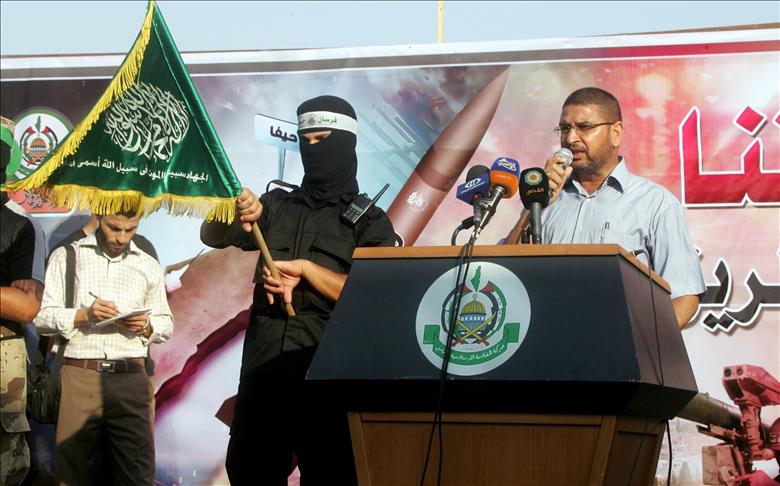Egypt court lists Hamas as terrorist group
Hamas spokesman Sami Abu Zuhri said the ruling signaled a shift in Egyptian-Palestinian relations.

GAZA CITY
Palestinian faction Hamas was designated by an Egyptian court on Saturday as a "terrorist" group.
The ruling has stunned the movement, which described it as "dangerous."
Hamas spokesman Sami Abu Zuhri said the ruling signaled a shift in Egyptian-Palestinian relations.
Hamas was founded on Dec. 14 of 1987 by a group of Muslim Brotherhood leaders in the Gaza Strip. These leaders included the late Sheikh Ahmed Yassin.
Having joined other Palestinian factions in resisting the Israeli occupation of Palestinian territories, Hamas formed a broad support base, not only in the Gaza Strip, but also in the West Bank.
In the Gaza Strip, Hamas runs a massive network of civil society and humanitarian organizations. This was one reason why it managed to enter every Palestinian street and alleyway, according to observers.
While the movement had presence in the West Bank and some Arab countries, its main influence remained to be confined to the Gaza Strip, which it controlled in 2007.
Hamas has started carrying arms against the Israeli occupation of Palestinian territories in 1987 when it created a military body, which it called "Palestinian Mujahedeen."
In 1992, Hamas formed its current military wing Qassam Brigades.
The Palestinian faction worked hard to expand its military wing during the second Palestinian uprising in 2000, turning it in a major and organized militia, particularly in the Gaza Strip.
In a previous bulletin, Qassam Brigades said it had more than 10,000 fighters in the Gaza Strip alone.
Qassam Brigades depends on guerrilla warfare tactics in its resistance to Israeli occupation of Palestinian territories .
Hamas was the target of three Israeli wars between 2008 and 2014, the last of which being the 51 operation, which was launched in July and August of 2014.
The Palestinian faction also succeeded in capturing several Israeli troops, including Israeli soldier Jilad Shalit in 2005. In 2011 Hamas signed a swap deal with Israel to exchange the captured soldier for 1,050 Palestinian prisoners.
The movement announced during the latest Israeli operation on Gaza that it had captured another Israeli soldier.
Israel also accuses Hamas of keeping the remains of an Israeli officer who was killed during confrontations with Hamas fighters in the southern Gaza Strip city of Rafah on Aug. 1 of 2014.
Nevertheless, Hamas did not confirm the presence of the remains of the officer in its custody.
In 2006, Hamas won a majority of seats in the Palestinian Legislative Council. However, the results of the elections were not recognized by either Israel or the United States.
Other Palestinian factions, including Fatah, also refused to participate in the Hamas government, accusing the government, which was led by Hamas leader Ismail Haniyeh, of failing to formulate a political program.
On April 23 of 2014, Hamas and Fatah, which controls the occupied West Bank, signed a reconciliation deal, opening the door for the formation of a national unity government.
Despite this, the government is yet to assume control of the Gaza Strip, something that has been hampered because of political rifts between Hamas and Fatah.
Hamas tries to build strong relations with Arab and Islamic states, including Qatar and Turkey.
The movement also established solid relations with the Iranian regime, but soon after the eruption of civil war in Syria in 2011, these relations deteriorated because Hamas refused to take sides with the regime of Syrian President Bashar al-Assad.
Relations between Hamas and Iran went back on track in December of last year when a high-level delegation from the movement visited Iranian capital Tehran.
A marked deterioration happened in relations between Hamas and Egypt soon after the ouster by the Egyptian army of Islamist President Mohamed Morsi in July of 2013.
Egyptian media accused Hamas of standing behind attacks against the Egyptian army in the Sinai Peninsula.
Egyptian authorities also launched a restless crackdown on a network of smuggling tunnels on Egypt's border with the Gaza Strip. The tunnels used to be Gaza's door to badly-needed commodities under an all-out blockade imposed by Israel since 2007.
In January of 2014, an Egyptian court of urgent matters designated Qassam Brigades as a "terrorist" organization too.
Anadolu Agency website contains only a portion of the news stories offered to subscribers in the AA News Broadcasting System (HAS), and in summarized form. Please contact us for subscription options.







